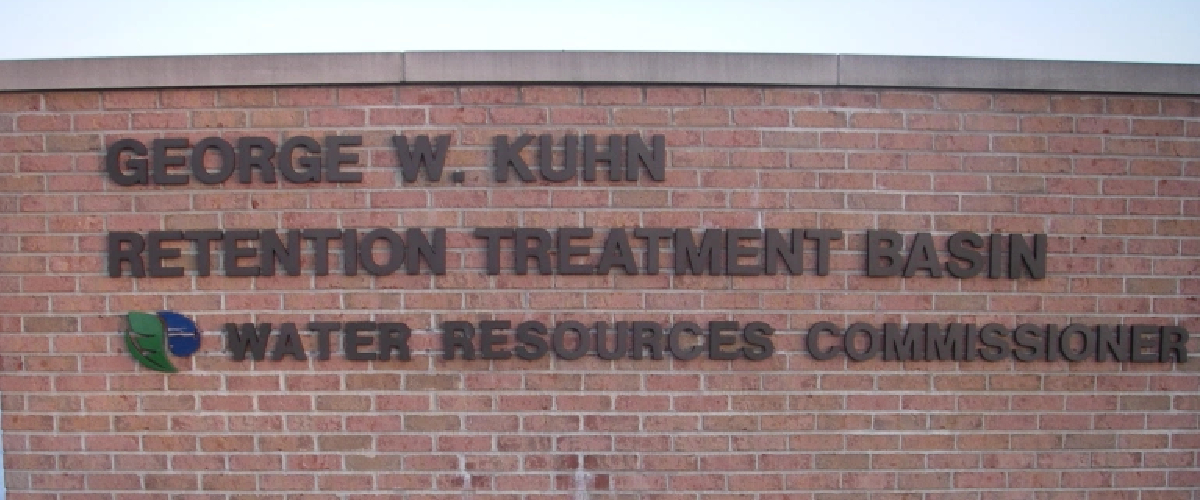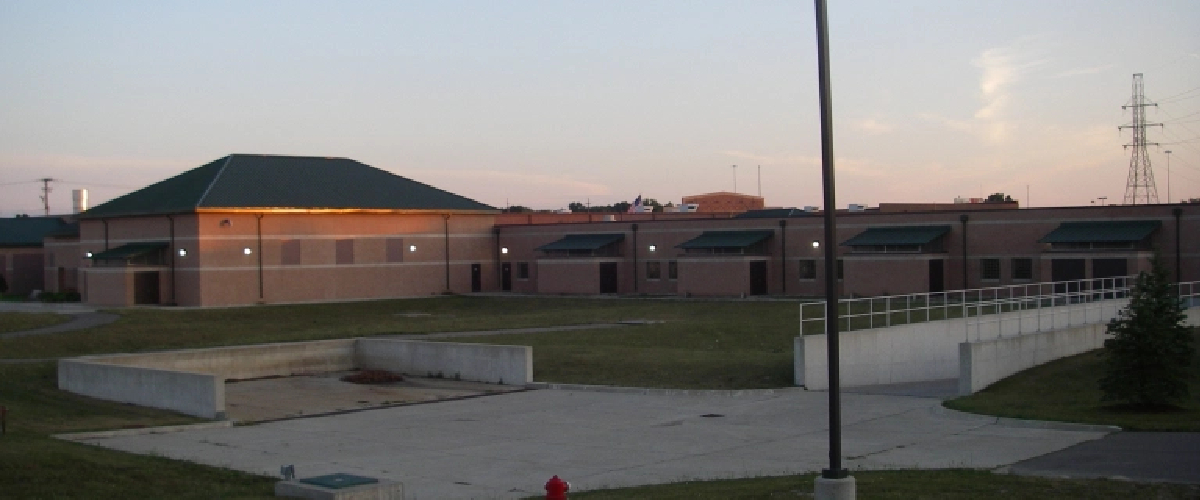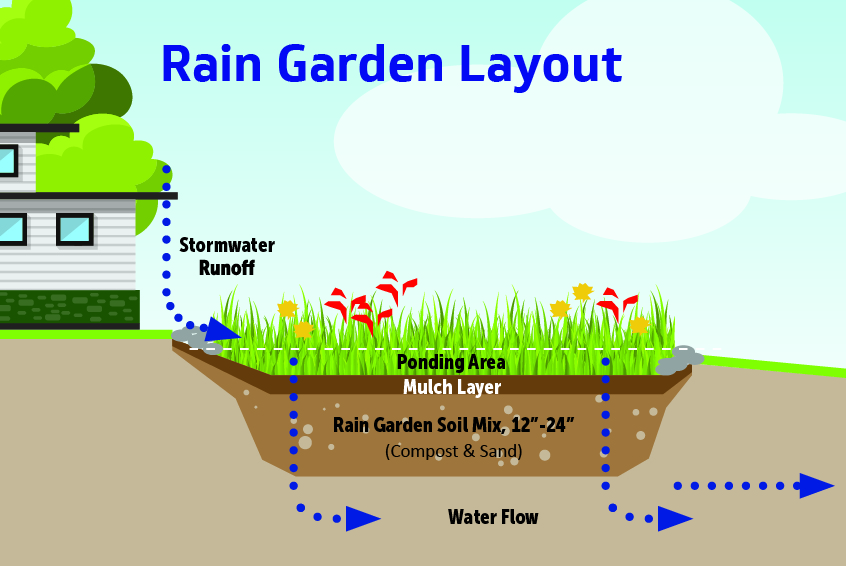Stormwater Billing Changes
If you are interested in becoming a member of our new Committee; The Stormwater Board of Appeals, Click Here.
ATTENTION OAK PARK UTILITY CUSTOMERS: Your utility bill has a new look. It now includes a storm water charge. Your storm water charge will be pro-rated until your entire billing period (which is printed on the upper right hand corner of your bill) is past 7-1-2020. Once your entire billing period is past 7-1-2020 your storm water charge will accurately reflect your quarterly/monthly charge for this fiscal year.
Stormwater Billing Changes - What's Going On?
Summary
The City of Oak Park recently adopted a modified utility billing method, which separates stormwater from water and sewer charges. All residential and business property owners will incur a separate line item cost for stormwater utility fees effective July 1, 2020.
Background
First, it is important to understand that the City of Oak Park has a combined sewage system. This means that sanitary sewage and stormwater sewage run through the same underground pipes.
Second, it is important to know about the George Kuhn Retention Treatment Facility. This facility serves all or part of 14 communities, encompassing a drainage area of 24,000 acres upstream from the Red Run Drain, a tributary of the Clinton River. During dry weather, all flow is routed to the Detroit Wastewater Treatment Plant, but during heavy rainfall, high volumes of combined sewage exceed the outlet capacity to Detroit, causing excess flow to be diverted to the George Kuhn Retention Treatment Facility where it is stored, screened, and disinfected prior to discharge to the Red Run Drain.
Due to the need for an expanded sewage system in our area, the George Kuhn Retention Treatment Facility was constructed in 2006. Outfitted with the latest in engineering and controls technology, this facility will protect and improve the quality of the Clinton River for decades to come.
To pay for the expansion of this facility, each municipality that falls within the George Kuhn Retention Treatment Facility district was ordered to pay for their proportional share of the project. This cost, along with the treatment costs for stormwater, are approximately half of the yearly expenditures for the City's stormwater costs.


For more on the George Kuhn Retention Treatment Facility, click here.
Third, in understanding why the City recently adopted a modified utility billing method, it is important to know that the City recently settled a class-action lawsuit filed by Royal Oak-based law firm Kickham Hanley P.L.L.C. on behalf of Oak Park residents. The lawsuit challenged the City’s approach to how the cost of stormwater treatment is distributed to water customers. As a result, the City separated stormwater from water and sewer charges to reflect each property’s unique contribution to stormwater runoff into the sewer system.
To view the settlement agreement for the lawsuit, click here.
Those interested in learning more about the settlement terms can contact Angeion Group, 1650 Arch Street, Suite 2210, Philadelphia, PA 19103, or call 1-866-780-5352, or email info@OakParkSettlement.com.
Reformulating Sewer Fees
Stormwater is charged to Oak Park's water and sewer customers because when it rains, surfaces drain water into the City's sewage system. This is called runoff. Runoff can enter the system in a number of ways, such as surface drainage into public structures, direct connections from private systems, and infiltration through the ground.
Previously, all sewer fees were charged based on water usage. Going forward, stormwater will be charged based on each customer's unique contribution to the City's overall runoff into our combined sewage system. This means that each property will now be responsible for paying for their fair share of a rain event. A customer's fair share of the City's total runoff potential, otherwise known as a customer's runoff potential, is calculated based upon the size of their property as well as how much pervious and impervious surface area they have.
Pervious surfaces allow water to seep into the ground. This includes dirt, grass, gardens, mulch, shrubs, trees, and other greenery. Impervious surfaces do not allow water to seep through but instead cause water to drain directly into the City's sewer system. This would include concrete sidewalks, driveways, other pavement, and structures such as houses, backyard sheds, and commercial buildings.
Calculating Runoff Potential
To calculate each water customer's runoff potential, the City studied pervious and impervious surface area for each property in Oak Park. The City contracted Quantum Spatial to perform an aerial assessment of Oak Park with infrared scanning to determine pervious and impervious surfaces. That data was then used in accordance with Oakland County parcel data to make determinations on surface type for each property in the City.
The potential runoff for a property is the pervious area of the property multiplied by a factor of 0.15 plus the impervious area of the property multiplied by a factor of 0.90. This formula can be seen below:
IA = Impervious Area
Pervious and impervious surfaces are weighted much differently since an estimated 90% of stormwater originating on an impervious surface discharges into the sewage system, whereas it is estimated that only 15% of stormwater originating on a pervious surface runs into the system.
How Utility Bills Will Change
In the past, Utility bills have included line item charges for the meter, water consumption, sewer usage, and garbage & rubbish. Until now, stormwater charges were included in the sewer usage charge. The new bill will separate the stormwater runoff charge into its own line item.
Most Oak Park residential customers will notice an overall bill decrease due to a reduction in the sewer charge, while others may experience a slight increase depending on property size and configuration. Most property owners of businesses will experience a bill increase.
A sample bill based on a typical residential monthly bill can be seen below:
|
Typical Water & Sewage Units |
7 |
|
Water Consumption |
35.49 |
|
Sewage Disposal |
38.22 |
|
Infrastructure (Average) |
5.00 |
|
Typical Residential Stormwater Runoff (Average) |
29.08 |
|
Rubbish Collection |
12.91 |
|
Total |
$120.70 |
Ways To Reduce Your Bill
Residents & Commercial Property owners can take measures to mitigate stormwater entering the City's sewage system resulting in a credit toward the utility bill. Examples include credits for use of rain barrels, rain gardens, dry wells, and infiltration trenches. Further, unused impervious surfaces also can be replaced with pervious surfaces, such as grass, plants, and more in order to decrease potential runoff.
To download Stormwater Rate Reduction Credit Information and Application(s), click here.

Frequently Asked Questions
Q: What has changed?
A: As of July 1, 2020, stormwater treatment cost will be displayed as an individual line item on all customers’ utility bills going forward.
Q: How will the utility bill look different?
A: In the past, utility bills have included line item charges for the meter, water consumption, sewer usage and garbage & rubbish. Until now, stormwater charges were included in the sewer usage charge. The new bill will separate the stormwater runoff charge into its own line item.
Q: Why the change?
A: The City of Oak Park recently settled a class-action lawsuit filed by Royal Oak-based law firm Kickham Hanley P.L.L.C. on behalf of Oak Park water customers. The lawsuit challenged the City’s approach to how the cost of stormwater treatment is distributed to customers. As a result of the settlement, utility bills will now reflect each property’s unique contribution to stormwater runoff into the sewer system.
Q: What is the City's position on the changes?
A: The City of Oak Park consistently strives to provide residents with the highest quality of services in a fair and efficient manner. The Stormwater Billing Changes are designed to ensure equitable distribution of resource costs. All revenue collected from customers for water, sewer, and stormwater charges sustain an Enterprise Fund, which designates the funds only for use on direct costs related to the water and sewer system. The change in utility billing methodology will not result in increased revenue for the City of Oak Park.
Q: What does this mean for customers?
A: Most Oak Park residential customers will notice an overall bill decrease due to a reduction in the sewer charge, while others may experience a slight increase depending on property size and configuration. Most property owners of businesses will experience a bill increase.
Q: What is the basis of the stormwater rate?
A: Stormwater originates from rainfall and melting snow and ice. Stormwater that does not evaporate can either soak into the ground, accumulate on land surfaces (which can cause flooding), or run off into the sewer system. Water and sewage charges cover sanitary use from inside the structure, e.g., water that leaves your home or building through sink drains and toilets, while stormwater charges are based on the amount of water the property owner’s land discharges into the sewer system.
The stormwater rate depends on property size and how much of that property is occupied by pervious and impervious surfaces. Pervious surfaces, such as grass and dirt, allow rainwater to seep into the soil, while rainwater on impervious surfaces – such as cement or asphalt driveways, parking lots, and rooftops – runs off into the sewer system.
Q: Who will be most impacted by the change in billing methodology?
A: The City of Oak Park currently occupies the most land in the city, which includes public parks, administrative buildings, and vacant properties from tax foreclosures, and will experience the heaviest increase in stormwater charges. The City’s three school districts – Oak Park, Ferndale, and Berkley – will also experience significant increases, along with several larger business entities.
Q: How will the City's stormwater charges be paid?
A: The City's portion will be paid out of the City's General Fund with no additional cost to water customers. In actuality, this new contribution from the General Fund to the Water and Sewer Fund will result in overall lower costs to all other City's customers.
Q: How can residents learn more about the settlement?
A: The water rate lawsuit filed against the City of Oak Park is currently closed. Those interested in learning more about the settlement terms can contact Angeion Group, 1650 Arch Street, Suite 2210, Philadelphia, PA 19103, or call 1-866-780-5352, or email info@OakParkSettlement.com.
To download a PDF document of FAQs regarding our stormwater billing changes, click here.
More Information
Letter Sent to Oak Park Residents
Letter Sent to Oak Park Business Owners
Letter Sent to Oak Park Faith Leaders
Helpful Links
Oak Park Settles Storm Water Fee Lawsuit for $2,850,000 - Oakland County Times
Ferndale Settles Water/Sewer Bill Lawsuit, Checks to be Mailed to Residents - Oakland County Times
Valentine explains why city to pay millions over storm water lawsuit - Hometown Life
Law firm gets rich off sewer lawsuits against cities and townships - Detroit Free Press
.jpg)




